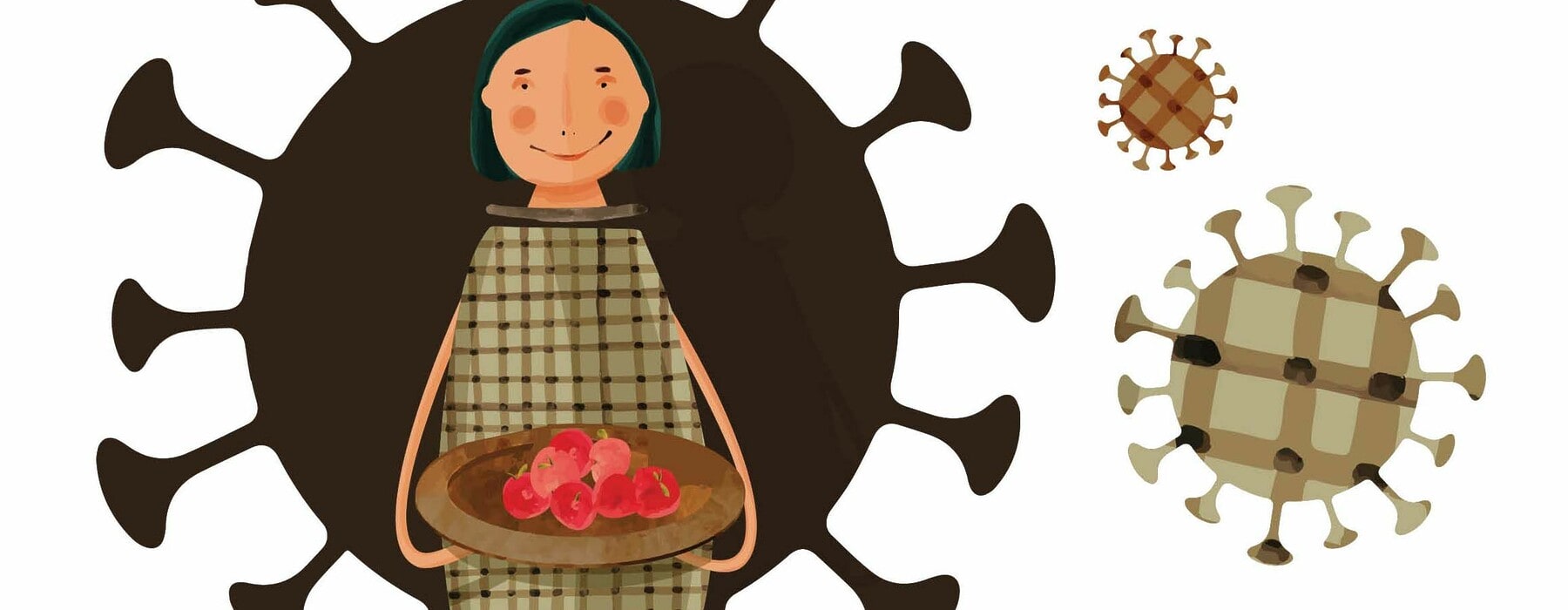In these Covid-19 days, anything that can bolster your immune system has to be good news. Sharon Stephenson goes in search of the truth about whether a good diet really can help you fight off bugs.
There are those who will tell you that an apple a day keeps the doctor away, that you can knock out a cold with a shot of vitamin C and that chicken soup really is good for the soul (and the immune system).
Those people would be correct. But, as with many things in life, it’s more complex than that, says Dr Anna Brooks, senior lecturer and immunologist at the University of Auckland.
“Your food and lifestyle choices make a huge difference to a healthy immune system,” says Anna, “and certain foods can definitely give your immune system the essential building blocks it needs. But there’s no clear evidence that there are any ‘magic foods’ or supplements you can take to replenish your immune system. The design of our immune system is complex and influenced by many factors, not just diet, and especially not by any one specific food or nutrient. Factors such as a lack of sleep, stress and excess weight can also play a part.”
And because everyone’s immune system is different, there’s no one-size-fits-all remedy.
To understand the link between immunity and food, we need to understand what our immune system is and how it works. At its most basic, it consists of a network of various stages and pathways in the body that protect us from harmful microbes and certain diseases we’re exposed to every day, from the common cold to Covid-19. It recognises these foreign invaders – bacteria, viruses and parasites – and takes immediate action to get rid of them.
Anna suggests it’s useful to think of our body as an apartment block, home to a number of different species. “When all the resident species are in harmony it’s great, but when unwanted visitors turn up, that’s when things can go wrong, especially with our immune system.”
Broadly speaking, humans have two types of immunity – innate and adaptive.
Innate immunity is the first line of defence against pathogens trying to enter the body, which is achieved through protective barriers. One of the strongest barriers we have against the majority of those pathogens is our skin, while another is mucus, which can trap pathogens. The cells in our blood are another defence, as they look out for harmful attackers, along with the gut, which is a major site of immune activity and a key fighter against microbial attacks.
Adaptive (also called acquired) immunity is when our immune system learns to recognise a pathogen.
“Our immunological memory helps to protect our immune system by kicking in when a pathogen re-enters our body,” Anna says. “That memory helps our system to recognise and remember a particular pathogen so if it reappears, our cells are even more efficient and quick to destroy it.”
Think nutrients
Ageing, mental stress and chronic diseases, such as autoimmune and immunodeficiency disorders that attack and potentially disable immune cells, can all make our immune system work less well. But one of the key risk factors for our immune system is a poor diet.
“Nutrients such as vitamin D and C, zinc, fatty acids, selenium, iron and protein are the building blocks of cells in our body, including the immune cells. But diets limited in variety and lower in nutrients, especially those with a high ratio of heavily processed foods and sugar, can affect the microbes in our gut, which negatively affects our immune system.”
The term “gut health” is bandied around a lot these days, but Anna cautions that the science in this area is still in its infancy. “Scientists have only been researching the gut microbiome and the link with immunity for the past few decades, so there are still a lot of unknowns about how the gut microbiome works. What we do know is that what we eat shapes the microbiome in our gut, which in turn helps to support a healthy immune system.”
The missing link
Anna, who started her career working on harnessing immune systems to fight cancer cells, is now focused on the role of immunity in infectious diseases, most recently with Covid-19.
As you’d expect, she’s an enthusiastic cheerleader for doing everything we can to ensure our immune systems are healthy to fight whatever environmental or mental stressors come our way.
“Professionally, and also in my personal journey of overcoming allergies, the key has always been prevention, not medication. So how can we replenish and support our immune systems with natural sources such as prebiotic and probiotic foods, which contain helpful bacteria and fibre that stimulate immune cell activity? We can get that via a variety of fruit, vegetables and wholegrains, as well as in foods containing live active cultures, such as fermented vegetables, kombucha and miso.
“However, not everyone will tolerate all these food groups in the same way, so we also need to be mindful that what works for one person may not for another.”
Anna says the first step to a healthy immune system is to check what nutrients you’re missing. That could include seeing a nutritionist who has specialised training in this area, or asking your GP.
“Some tests you might have to pay for, such as the zinc test, which can be around $100. But it’s helpful to find out exactly where you might be lacking.”
Once armed with that information, Anna suggests finding out how to source any missing nutrients from your food.
When to pop a pill
“Find out what’s in your food,” Anna says, “and remember that too much of a good thing can sometimes not be a good thing.”
An example of that is having one Brazil nut a day, which provides your daily selenium allowance. “But if you eat 10 Brazil nuts a day, you run the risk of toxicity. Once you know what you’re lacking, you can research what you need to eat to support a healthy immune system, which can leave you less likely to suffer from certain illnesses.”
When it comes to our immune system, we’ve long been told by the supplements industry that popping a pill every day can help to replace those essential nutrient building blocks. That can be true to a certain extent, says Anna. “Supplements aren’t the be all and end all, but if you are deficient in a certain nutrient they can assist. But there’s no point in throwing pills and money down your throat if you don’t need them. That’s why finding out what you’re deficient in first, and then trying to get those nutrients from your diet, would be my advice. And then if you’re still deficient, maybe look into some supplementation.”
If you’re keen to go down the supplements road, Anna suggests first getting professional advice on what to take. “They can also advise on quality and quantities, given that the nutrient industry doesn’t have the stringent regulations that medicines have.”
Again, she warns about the risk of toxicity if too much of a certain nutrient is taken, which can actually harm your health.
United States studies have shown that vitamin supplementation can improve the immune response in low-income householders, pregnant and breastfeeding women, infants and toddlers, and the chronically ill, as well as the elderly, whose immune response generally declines as the number and quality of immune cells decrease.
But Anna stresses that supplements are not a substitute for a good diet. “The key is to get your nutrient levels tested, stick to good eating strategies and be patient, because changing lifestyles and diets and replenishing your immune system doesn’t happen overnight.”








